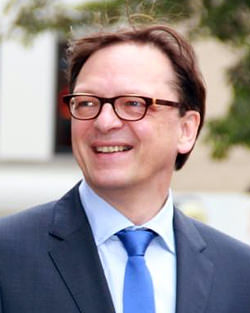
Luc Deliens PhD MA MSc is a medical sociologist, Director of the End-of-Life Care Research Group of Ghent University & VUB Brussels and Professor of Public Health and Palliative Care at the EMGO+ Institute, VU University Medical Centre Amsterdam. Since 2000 in Brussels he has gradually developed a unique multidisciplinary research team of about 30 researchers with clinical (MD and RN), sociological, psychological and ethical backgrounds (www.endoflifecare.be). He has successfully supervised 15 PhD students and is currently supervising 26. He has published more than 200 journal articles and over 100 book chapters or reports. In 2009, he was appointed to be a member of the Royal Academy of Medicine of Belgium, the first person to represent palliative and end-of-life care, and one of the few con-clinicians. In 2011, he was appointed Co-Chair of the EAPC Research Network of the European Association for Palliative Care (EAPC) (www.eapcrn.org). He has received several scientific awards for his research, e.g. in 2005 the three-yearly Prize De Beys, which is considered by the King Baudouin Foundation as the Belgian Nobel Prize for Social Medicine and, with a value of €150.000, one of the most prestigious scientific awards in medical research in Belgium. Furthermore, his post docs and PhD fellows have also received several awards, e.g. the laureate of the EAPC Young Investigators Award 2010 (Joachim Cohen) and 2nd prize of the EAPC Young Investigators Award 2011 (Judith Rietjens).
He has published extensively on end-of-life care including palliative care and end-of-life decision-making in leading general medical journals (e.g. 1xNew Eng J Med, IF47.050; 5xLancet, IF30.758; 1xJAMA, IF28.899; 3xBrit Med J, IF13.660; 6xArch Int Med, IF9.813; 2xCan Med Ass J, IF7.271), leading palliative care journals (e.g. >20xJ Pain Symptom Manag, >20x Pal Med, J Pal Med) and in other specialised journals in the fields of public health (e.g. Med Care, J Epidemiol Comun Health), health care sciences & services (e.g. Med Decis Making, Health Serv Res), geriatrics & gerontology (e.g. JAGS, J Gerontology) and oncology (e.g. 2xJ Clin Onco, IF17.793). About 95% of his papers have been published in journals ranking in the upper half of their domain, about 50% in Q1 (upper 25%), and about 20% in D1 (upper 10%). His work has been supported by a grant income of over €16,000,000 in the last ten years from different funders, including the EU 5th to 7th FP, FWO Research Foundation, Flanders, IWT the Flemish Government Agency for Innovation by Science and Technology, DWTC the Belgian Federal Ministry of Science Policy, VWS the Dutch Ministry of Public Health, ZONMW the Netherlands Organisation for Health Research and Development, King Baudouin Foundation and other leading medical and health charities, mainly in the areas of public health, cancer and dementia.
He is leading on-going local and national studies (e.g. FLIECE, an interuniversity 2.5 M€ IWT-SBO project to improve end-of-life care in Flanders; www.endoflifecare.be/fliece). His present research is focused on palliative care and end-of-life decision-making and structured along three research lines: public health (e.g. place of death, care setting transitions, un-wished-for and avoidable hospitalisation at the end of life, end-of-life decisions and attitudes of the public towards palliative care and end-of-life decisions), cancer (e.g. early diagnosis of palliative care needs, palliative care quality indicators, end-of-life communication), and non-cancer (e.g. palliative care in nursing homes, advance care planning, Liverpool Care Pathway on acute geriatric wards).
Internationally, he is coordinator of the EU 7th FP EURO IMPACT European Intersectorial and Multi-disciplinary Palliative Care Research Training, a Marie Curie Initial Training Network (www.endoflifecare.be/euroimpact) (2010-2014); the EURO SENTIMELC study on end-of-life care trajectories in Belgium, the Netherlands, Italy and Spain (2009-2012); and the IPod study, which is the first worldwide place of death study including Mexico, New Zealand, Australia, USA, Canada, Japan, South Korea, and several European countries (2010-2015). Furthermore he participates in the UNBIASED study on palliative sedation in the UK, the Netherlands and Belgium, coordinated by Nottingham University; the longitudinal EPCCC study on palliative care cancer symptoms in Europe, coordinated by the University of Trondheim in Norway; and was involved in the PRISMA project (EU 7th FP) on outcome measures in palliative care coordinated by King’s College London; and in the EURELD study (EU 5th FP) on end-of-life decisions in Europe, coordinated by the Erasmus MC university Rotterdam. As Co-Chair of EAPC RN and member of the Scientific Committee, he co-organises the EAPC RN congresses and seminars; he is Associate Editor of BMC Geriatrics, member of the Advisory Editorial Board of Palliative Medicine, member of the Advisory Committee for the National Cancer Research Institute – funded by Supportive and Palliative Care ‘Cancer Experiences’ (CECo), UK, coordinated by Lancaster University - and member of the Scientific Advisory Group to the new WHO guide Palliative Care for the Older People: Better Practice, coordinated by King’s College London. He is also member of several review commissions for grant applications, e.g. for the Fund for Scientific Research Flanders, and member of the Steering Committee of the NRP67, a 15 M CHF national research program on “end of life” of the Swiss National Science Foundation (2011-2017).
緩和的鎮静と安楽死
要約
緩和ケアの進歩にもかかわらず、終末期がん患者で臨死期に様々な程度の苦痛を体験している例が少なくない。その苦痛の程度が耐え難くなり通常の治療や最善の緩和ケアを施行してもコントロール・治療できなくなった際に、苦痛を緩和するための選択肢として2つ、すなわち緩和的鎮静と安楽死とがある。緩和的鎮静は意識を故意に低下させることであり世界全ての国で正当なものとされている。安楽死は、患者の明白な要求に従い医師により致死的薬剤を投与することをいい、ヨーロッパのごく限られた国、ベルギー、オランダ、ルクセンブルクで法律上正当とされている。さらに医師による自殺幇助は、アメリカのモンタナ、オレゴン、ワシントン州、そしてヨーロッパのスイスで法律上正当とされている。
緩和的鎮静は、浅いレベルから深いレベルまで変更可能で、間欠的あるいは持続的に使用することができる。緩和的鎮静の中で最も広い領域で論争になることのあるタイプは、死を迎えるまで持続的に鎮静を行うことである。鎮静を必要とするような耐え難くて持続性あるいは”難治性”の症状の存在に加え、ほとんどの鎮静のガイドラインでは患者の疾患が進行しており改善の見通しがなく、予想される予後が時間あるいは日単位であることを述べている。可能な限り、患者は意思決定や鎮静導入の同意に積極的に含められるべきである。患者に決定能力がない場合、医師は患者の代理人の意見を聞くべきである。鎮静の目的は症状を緩和することであり死を早めることではない。緩和的鎮静の実施率を報告している研究が幾つかあるが、医師らが今生存している終末期患者に対して亡くなるときまで持続的鎮静を施行するような状況について深く踏み込んで洞察したものはない。
安楽死では、患者を死に至らしめる時間は数分以内に可能であるようにすべきであり、医師は厳密で十分なケアの必要条件に従わなければならない。安楽死の意思決定は患者‐医師間の関係性の間に決定され、(社会的な)コントロールは死後の検証の手続きの中で確立される。ケアにおいて患者に安楽死を行うことしか他にできることがないという医師がいるかもしれない。医師は患者が以下のことを十分に評価できているということを知らなければならない。それは患者の安楽死の要望が自発的であり熟考されたものなのかどうか、患者の医学的状況が改善の見込みがないのかどうか、そして苦痛が耐えられないものなのかどうかということである。安楽死を望む患者には、自分の状況(診断や予後)、全ての考えられる出来うる治療手段について十分に告知されなければならない。患者の安楽死の希望は、文書でなければならなく、複雑であるようなら治療チーム(看護師など)や患者によって指名されている人との相談が明示的に必要とされる。主治医は安楽死の要求に応ずる前に、関係がなかろうと患者の治療に関わっていなかろうと、同僚に最初に相談しなければならない。
この発表では、緩和的鎮静と安楽死の実施率やエンド・オブ・ライフの実際に関する活発な論争についての最近の研究を検証したいと思う。
(邦訳:小池和彦)










